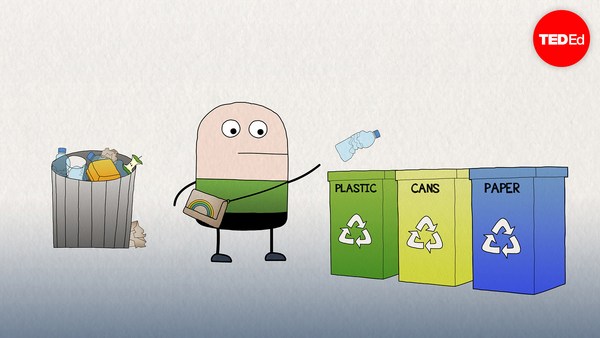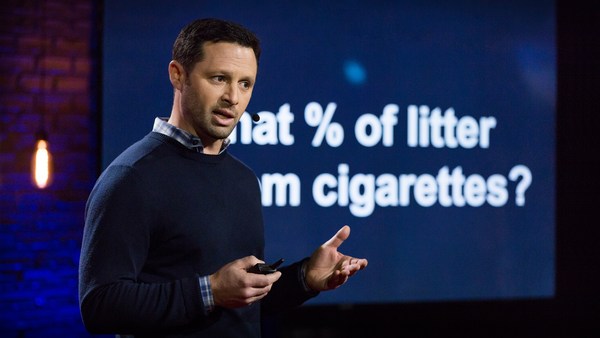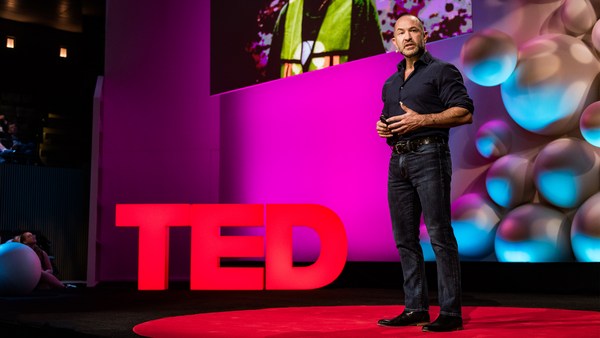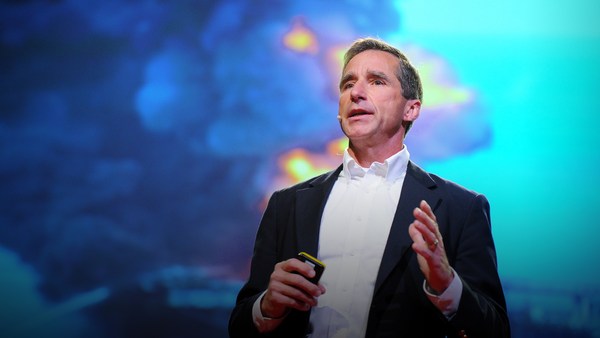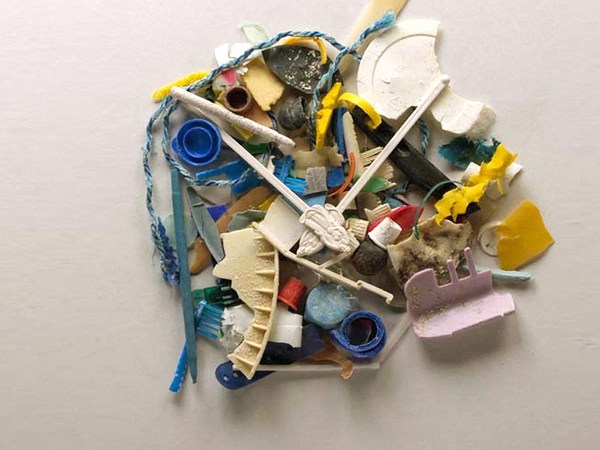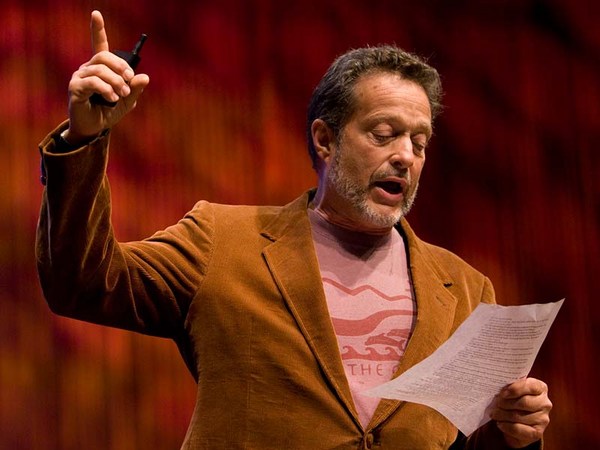Chris Anderson: So, you've been obsessed with this problem for the last few years. What is the problem, in your own words?
Andrew Forrest: Plastic. Simple as that. Our inability to use it for the tremendous energetic commodity that it is, and just throw it away.
CA: And so we see waste everywhere. At its extreme, it looks a bit like this. I mean, where was this picture taken?
AF: That's in the Philippines, and you know, there's a lot of rivers, ladies and gentlemen, which look exactly like that. And that's the Philippines. So it's all over Southeast Asia.
CA: So plastic is thrown into the rivers, and from there, of course, it ends up in the ocean. I mean, we obviously see it on the beaches, but that's not even your main concern. It's what's actually happening to it in the oceans. Talk about that.
AF: OK, so look. Thank you, Chris. About four years ago, I thought I'd do something really barking crazy, and I committed to do a PhD in marine ecology. And the scary part about that was, sure, I learned a lot about marine life, but it taught me more about marine death and the extreme mass ecological fatality of fish, of marine life, marine mammals, very close biology to us, which are dying in the millions if not trillions that we can't count at the hands of plastic.
CA: But people think of plastic as ugly but stable. Right? You throw something in the ocean, "Hey, it'll just sit there forever. Can't do any damage, right?"
AF: See, Chris, it's an incredible substance designed for the economy. It is the worst substance possible for the environment. The worst thing about plastics, as soon as it hits the environment, is that it fragments. It never stops being plastic. It breaks down smaller and smaller and smaller, and the breaking science on this, Chris, which we've known in marine ecology for a few years now, but it's going to hit humans. We are aware now that nanoplastic, the very, very small particles of plastic, carrying their negative charge, can go straight through the pores of your skin. That's not the bad news. The bad news is that it goes straight through the blood-brain barrier, that protective coating which is there to protect your brain. Your brain's a little amorphous, wet mass full of little electrical charges. You put a negative particle into that, particularly a negative particle which can carry pathogens -- so you have a negative charge, it attracts positive-charge elements, like pathogens, toxins, mercury, lead. That's the breaking science we're going to see in the next 12 months.
CA: So already I think you told me that there's like 600 plastic bags or so for every fish that size in the ocean, something like that. And they're breaking down, and there's going to be ever more of them, and we haven't even seen the start of the consequences of that.
AF: No, we really haven't. The Ellen MacArthur Foundation, they're a bunch of good scientists, we've been working with them for a while. I've completely verified their work. They say there will be one ton of plastic, Chris, for every three tons of fish by, not 2050 -- and I really get impatient with people who talk about 2050 -- by 2025. That's around the corner. That's just the here and now. You don't need one ton of plastic to completely wipe out marine life. Less than that is going to do a fine job at it. So we have to end it straightaway. We've got no time.
CA: OK, so you have an idea for ending it, and you're coming at this not as a typical environmental campaigner, I would say, but as a businessman, as an entrepreneur, who has lived -- you've spent your whole life thinking about global economic systems and how they work. And if I understand it right, your idea depends on heroes who look something like this. What's her profession?
AF: She, Chris, is a ragpicker, and there were 15, 20 million ragpickers like her, until China stopped taking everyone's waste. And the price of plastic, minuscule that it was, collapsed. That led to people like her, which, now -- she is a child who is a schoolchild. She should be at school. That's probably very akin to slavery. My daughter Grace and I have met hundreds of people like her.
CA: And there are many adults as well, literally millions around the world, and in some industries, they actually account for the fact that, for example, we don't see a lot of metal waste in the world.
AF: That's exactly right. That little girl is, in fact, the hero of the environment. She's in competition with a great big petrochemical plant which is just down the road, the three-and-a-half-billion-dollar petrochemical plant. That's the problem. We've got more oil and gas in plastic and landfill than we have in the entire oil and gas resources of the United States. So she is the hero. And that's what that landfill looks like, ladies and gentlemen, and it's solid oil and gas.
CA: So there's huge value potentially locked up in there that the world's ragpickers would, if they could, make a living from. But why can't they?
AF: Because we have ingrained in us a price of plastic from fossil fuels, which sits just under what it takes to economically and profitably recycle plastic from plastic. See, all plastic is is building blocks from oil and gas. Plastic's 100 percent polymer, which is 100 percent oil and gas. And you know we've got enough plastic in the world for all our needs. And when we recycle plastic, if we can't recycle it cheaper than fossil fuel plastic, then, of course, the world just sticks to fossil fuel plastic.
CA: So that's the fundamental problem, the price of recycled plastic is usually more than the price of just buying it made fresh from more oil. That's the fundamental problem.
AF: A slight tweak of the rules here, Chris. I'm a commodity person. I understand that we used to have scrap metal and rubbish iron and bits of copper lying all round the villages, particularly in the developing world. And people worked out it's got a value. It's actually an article of value, not of waste. Now the villages and the cities and the streets are clean, you don't trip over scrap copper or scrap iron now, because it's an article of value, it gets recycled.
CA: So what's your idea, then, to try to change that in plastics?
AF: OK, so Chris, for most part of that PhD, I've been doing research. And the good thing about being a businessperson who's done OK at it is that people want to see you. Other businesspeople, even if you're kind of a bit of a zoo animal species they'd like to check out, they'll say, yeah, OK, we'll all meet Twiggy Forrest. And so once you're in there, you can interrogate them. And I've been to most of the oil and gas and fast-moving consumer good companies in the world, and there is a real will to change. I mean, there's a couple of dinosaurs who are going to hope for the best and do nothing, but there's a real will to change. So what I've been discussing is, the seven and a half billion people in the world don't actually deserve to have their environment smashed by plastic, their oceans rendered depauperate or barren of sea life because of plastic. So you come down that chain, and there's tens of thousands of brands which we all buy heaps of products from, but then there's only a hundred major resin producers, big petrochemical plants, that spew out all the plastic which is single use.
CA: So one hundred companies are right at the base of this food chain, as it were.
AF: Yeah.
CA: And so what do you need those one hundred companies to do?
AF: OK, so we need them to simply raise the value of the building blocks of plastic from oil and gas, which I call "bad plastic," raise the value of that, so that when it spreads through the brands and onto us, the customers, we won't barely even notice an increase in our coffee cup or Coke or Pepsi, or anything.
CA: Like, what, like a cent extra?
AF: Less. Quarter of a cent, half a cent. It'll be absolutely minimal. But what it does, it makes every bit of plastic all over the world an article of value. Where you have the waste worst, say Southeast Asia, India, that's where the wealth is most.
CA: OK, so it feels like there's two parts to this. One is, if they will charge more money but carve out that excess and pay it -- into what? -- a fund operated by someone to tackle this problem of -- what? What would that money be used for, that they charge the extra for?
AF: So when I speak to really big businesses, I say, "Look, I need you to change, and I need you to change really fast," their eyes are going to peel over in boredom, unless I say, "And it's good business." "OK, now you've got my attention, Andrew." So I say, "Right, I need you to make a contribution to an environmental and industry transition fund. Over two or three years, the entire global plastics industry can transition from getting its building blocks from fossil fuel to getting its building blocks from plastic. The technology is out there. It's proven." I've taken two multibillion-dollar operations from nothing, recognizing that the technology can be scaled. I see at least a dozen technologies in plastic to handle all types of plastic. So once those technologies have an economic margin, which this gives them, that's where the global public will get all their plastic from, from existing plastic.
CA: So every sale of virgin plastic contributes money to a fund that is used to basically transition the industry and start to pay for things like cleanup and other pieces.
AF: Absolutely. Absolutely.
CA: And it has the incredible side benefit, which is maybe even the main benefit, of creating a market. It suddenly makes recyclable plastic a giant business that can unlock millions of people around the world to find a new living collecting it.
AF: Yeah, exactly. So all you do is, you've got fossil fuel plastics at this value and recycled plastic at this value. You change it. So recycled plastic is cheaper. What I love about this most, Chris, is that, you know, we waste into the environment 300, 350 million tons of plastic. On the oil and gas companies own accounts, it's going to grow to 500 million tons. This is an accelerating problem. But every ton of that is polymer. Polymer is 1,000 dollars, 1,500 dollars a ton. That's half a trillion dollars which could go into business and could create jobs and opportunities and wealth right across the world, particularly in the most impoverished. Yet we throw it away.
CA: So this would allow the big companies to invest in recycling plants literally all over the world --
AF: All over the world. Because the technology is low-capital cost, you can put it in at rubbish dumps, at the bottom of big hotels, garbage depots, everywhere, turn that waste into resin.
CA: Now, you're a philanthropist, and you're ready to commit some of your own wealth to this. What is the role of philanthropy in this project?
AF: I think what we have to do is kick in the 40 to 50 million US dollars to get it going, and then we have to create absolute transparency so everyone can see exactly what's going on. From the resin producers to the brands to the consumers, everyone gets to see who is playing the game, who is protecting the Earth, and who doesn't care. And that'll cost about a million dollars a week, and we're going to underwrite that for five years. Total contribution is circa 300 million US dollars.
CA: Wow. Now --
(Applause)
You've talked to other companies, like to the Coca-Colas of this world, who are willing to do this, they're willing to pay a higher price, they would like to pay a higher price, so long as it's fair.
AF: Yeah, it's fair. So, Coca-Cola wouldn't like Pepsi to play ball unless the whole world knew that Pepsi wasn't playing ball. Then they don't care. So it's that transparency of the market where, if people try and cheat the system, the market can see it, the consumers can see it. The consumers want a role to play in this. Seven and a half billion of us. We don't want our world smashed by a hundred companies.
CA: Well, so tell us, you've said what the companies can do and what you're willing to do. What can people listening do?
AF: OK, so I would like all of us, all around the world, to go a website called noplasticwaste.org. You contact your hundred resin producers which are in your region. You will have at least one within an email or Twitter or a telephone contact from you, and let them know that you would like them to make a contribution to a fund which industry can manage or the World Bank can manage. It raises tens of billions of dollars per year so you can transition the industry to getting all its plastic from plastic, not from fossil fuel. We don't need that. That's bad. This is good. And it can clean up the environment. We've got enough capital there, we've got tens of billions of dollars, Chris, per annum to clean up the environment.
CA: You're in the recycling business. Isn't this a conflict of interest for you, or rather, a huge business opportunity for you?
AF: Yeah, look, I'm in the iron ore business, and I compete against the scrap metal business, and that's why you don't have any scrap lying around to trip over, and cut your toe on, because it gets collected.
CA: This isn't your excuse to go into the plastic recycling business.
AF: No, I am going to cheer for this boom. This will be the internet of plastic waste. This will be a boom industry which will spread all over the world, and particularly where poverty is worst because that's where the rubbish is most, and that's the resource. So I'm going to cheer for it and stand back.
CA: Twiggy, we're in an era where so many people around the world are craving a new, regenerative economy, these big supply chains, these big industries, to fundamentally transform. It strikes me as a giant idea, and you're going to need a lot of people cheering you on your way to make it happen. Thank you for sharing this with us.
AF: Thank you very much. Thank you, Chris.
(Applause)
